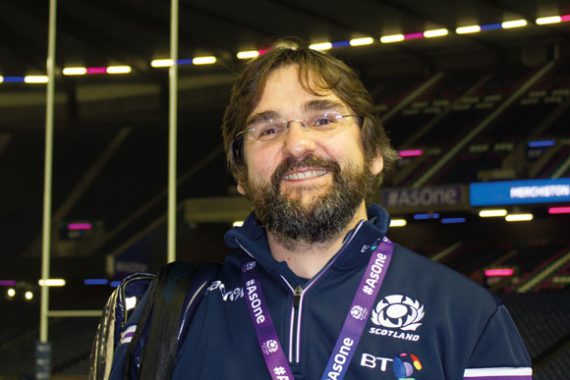Pitch perfect – the rugby team doctor

Friday
10.00
I meet the squad at the training ground for the ‘medical check-in’, where I certify each player is fit. We have an away match tomorrow against Ireland, so I will be on duty for three days.
The Scotland Club International XV is made up of top amateur players from the Scottish Rugby Union (SRU) Premiership; team members are awarded a Scotland club international cap and a number will go on to professional careers and the top international team.
I work with two physiotherapists to look after the 30-strong squad. We check our equipment – emergency/resus kit, general medical kit, physio kit and drugs box – and give it to our kit manager before boarding the team bus to the airport.
After dinner at the hotel we hold a clinic for any players needing treatment or advice. I’m responsible for the team’s general practice care, as well as any rugby-related injuries that arise.
Saturday
06.30
As always on a match-day morning it’s an early rise. We check the kit again, then meet the coaches over breakfast before taking the team bus to the host ground.
While the squad does the ‘Captain’s run’ training session, I look over the medical room, locate the ground’s kit and our changing rooms and explore the pitchside set-up, including access routes for emergencies.
I played rugby until I was 18 and remain a passionate fan and an avid follower of the annual Six Nations tournament – which features France and Italy as well as the home nations – so I snapped up a chance to train as a medic for the Edinburgh Academicals rugby team at the end of my GP registrar year. As well as Level 3 trauma/prehospital care training, I completed the SRU’s SCRUMCAPS course and the England Rugby Football Union equivalent, Immediate Care in Sport. Both cover rugby-specific prehospital trauma care as well as common injuries such as concussion. I also hold my BASICS certificate. I began working as a doctor with SRU, before becoming team doctor for one of the Scotland squads.
10.30
We hold a clinic at the hotel. One player is carrying a minor acromioclavicular joint problem and is heavily strapped up; we check no issues have arisen in the training session and clear him to play.
17.30
Back at the host ground, I meet the match doctor and paramedics, the opposition doctor and a host official. We agree on how we will do medical signals, head injury assessments and injury handling. I relay this information to our physios and we double-check our radios.
19.30
After the anthems we kick-off, and I roam the touchline for the next 80 minutes, watching for potential injury.
A ruck splits up and one of our players is clutching his chest, so we run on. He appears to have fractured ribs. I reassess him in the medical room, give analgesia and keep him under review. His pain subsequently localises to the left upper quadrant so I send him for a scan, which rules out splenic injury.
During a match we might see head and neck injuries, concussion, chest-wall trauma, sprains, strains, fractures and dislocations. More serious problems I’ve dealt with include retroperitoneal haemorrhage, splenic laceration, loss of consciousness with airway problems, cervical spine injury and open fractures – but thankfully such cases are rare and many matches are relatively injury free.
21.00
I review our injured players and advise on follow-up, then we all have dinner. I keep an eye on the squad, checking that the player with fractured ribs and another with concussion are following our advice and that they and their roommates know how to reach us.
Sunday
07.30
We hold another clinic and then a medical ‘check-out’. It’s a relief when the players have signed off their medical sheet – another match completed without major injury or illness. I complete paperwork, and we head home.
Profile: Dr Andy Mcintosh
Roles: Sessional GP in Jedburgh; team doctor for Scotland Club International XV
Hours worked per week: Five to six clinical sessions each week in NHS general practice; one to two monthly out-of-hours GP shifts; one or two sessions per week as team doctor during the rugby season











